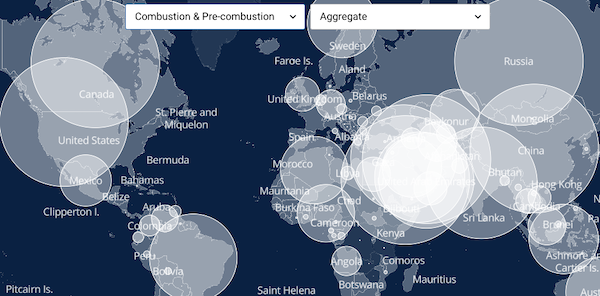SEJournal Online is the digital news magazine of the Society of Environmental Journalists. Learn more about SEJournal Online, including submission, subscription and advertising information.
 |
| A new global fossil fuels registry may prove useful to reporters — despite some data accuracy questions. Above, a screenshot from the database. Photo: Fossilfuelregistry.org. |
Reporter’s Toolbox: Fossil Fuels Registry Promises Global Warming Data. Does It Deliver?
By Joseph A. Davis
If you cover climate and energy — and most environmental journalists eventually do — you probably want to be aware of a new data tool that may help: the Global Registry of Fossil Fuels.
OK, the news on the climate front tends to be depressing. So are the numbers. But the greenhouse warming crisis really is an international story that needs a global lens. This data product may help meet that need.
Toolbox first became aware of the registry via a Sept. 19 Associated Press story. That, you may remember, was the first day of Climate Week, which is a kind of all-in climate pep rally timed to coincide with the U.N. General Assembly meeting. The press conference announcing the registry included the director of the U.N. Environment Program. Despite the hype, it was not really a “first-ever” data set (but may be for some aspects).
So you would be wise to keep this “global registry” in context. It’s valuable partly because the data available is often so bad (how, for instance, can you be sure that fossil fuel data from China is accurate?). That means it’s worth trying to check and source any data you get. From anywhere.
Where the data comes from
The registry is a big database that draws from multiple sources. That in itself may create some apples-and-oranges problems.
The biggest share of the data comes from the U.S. Energy Information Administration, or EIA. This federal agency, administered under the Energy Department, is known to be independent and reliable.
The EIA itself has a broad range of data products that you should know about and explore. Start here. These days the EIA is producing many takes on energy questions (production and consumption, domestic and international, fossil and non-fossil) that shed a lot of light on environmental issues.
But if we tell you that the registry’s data is not perfect, that does not distinguish it from the other available sources. It should just be one of several ways to get the global picture.
What if we told you that some of the registry’s
data comes from the oil company BP? ...
Another major source for the registry is OPEC.
But what if we told you that some of the registry’s data comes from the oil company BP? Would that raise your confidence level? We tend not to rely on energy companies to cover energy reliably so that one fact can take you quickly into #ExxonKnew territory. But be aware and make up your own mind; check out the BP Statistical Review of World Energy yourself.
Another major source for the registry is OPEC. That’s right: the Organization of Petroleum Exporting Countries. It really does have a viewpoint and makes it known every year when the Conference of Parties for the U.N. Framework Convention on Climate Change meets to struggle with a heating world.
There are other sources as well, but we can’t tell you about them, because when Toolbox first visited the site, the “processed data” and “unprocessed data” sections were not working (although they appear to have come online subsequently). Now that we mention it, some of the site’s menu tabs did not work either. Toolbox also looked for a search engine, but couldn’t find one.
How to use the data smartly
Still, we see some promise for the registry, if it ever accomplishes the goals it has advertised. So far, it hasn’t. Our best advice is to take note and then wait a bit longer for it to build out a functioning tool.
Despite its flaws, though, the registry seems to have decent documentation of how it is compiled. What that shows is that some of the data comes from models. Behind the registry are two other organizations that are players in the energy field: Carbon Tracker and Global Energy Monitor. Further support comes from New York Community Trust and Generation Foundation.
There is also the International Energy Agency, which offers a lot of data. It is a good source for many questions but has its own problems. It is not merely an association of governments and is not affiliated with the U.N. Its membership criteria tend to favor countries in the Organisation for Economic Co-operation and Development, or OECD, which favors rich countries, including oil-consuming nations. Most of its data is free, but not all.
Bottom line: For now, start with the EIA.
Joseph A. Davis is a freelance writer/editor in Washington, D.C. who has been writing about the environment since 1976. He writes SEJournal Online's TipSheet, Reporter's Toolbox and Issue Backgrounder, and curates SEJ's weekday news headlines service EJToday and @EJTodayNews. Davis also directs SEJ's Freedom of Information Project and writes the WatchDog opinion column.
* From the weekly news magazine SEJournal Online, Vol. 7, No. 36. Content from each new issue of SEJournal Online is available to the public via the SEJournal Online main page. Subscribe to the e-newsletter here. And see past issues of the SEJournal archived here.










 Advertisement
Advertisement 



